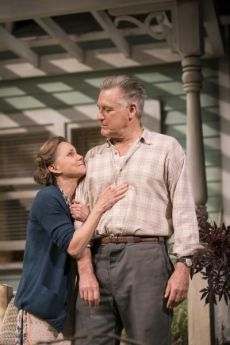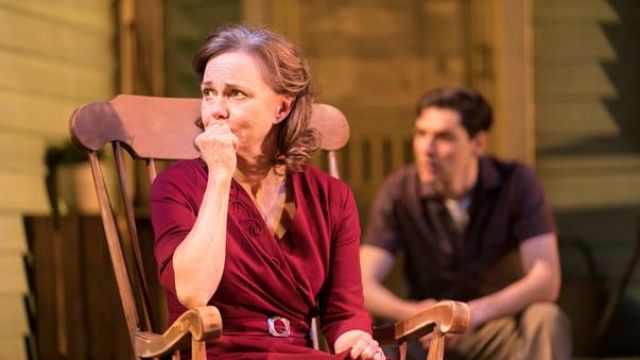All My Sons
In this intimate, beautifully acted production, Arthur Miller tells his story of 1947 America through a mid-Western family, the Kellers, and their neighbours. Set two years after the end of WWII, it tells of individualism versus community, of the ruthless ethos of ‘winning and ‘success’ at any cost, of idealism versus hard-headed pragmatism, of the big lie in plain sight and of the rationale of the of ‘family’. You might go to see this because it’s a venerable if ‘old’ play, or because it stars Sally Field, Bill Pullman and Jenna Coleman (TV’s young Queen Victoria), but - despite its detailed period setting and the heightened naturalism of the performances - Miller’s psychological and ideological insights hold (unfortunately) just as true today.
Designer Max Jones provides not just the exact 1940s clothing, but the backyard of an iconic weatherboard cottage, complete with porch, screen door, climbing roses and shady trees along the white picket fence and around the arbour – unostentatious but the reward of success. Joe Keller (Bill Pullman), who effects a kind of gruff hail-fellow-well-met persona, is a businessman, a factory owner, made wealthy enough by supplying airplane parts during the war, but his elder son, Larry, a pilot, is MIA – and his wife Kate Keller (Sally Field) is determined beyond reason to believe Larry is still alive. Meanwhile, younger son Chris (Colin Morgan) a survivor who lost almost all his company in the war, is in love with Ann Deever (Jenna Coleman), his brother’s girl – and Kate is fiercely opposed to that.
Across one Sunday, in the sunny backyard - that grows increasingly darker – secrets that are, in fact, not even so secret, come out. Joe’s factory manager, Steve Deever, Ann’s father, is in gaol: back in ’42, the factory supplied defective engine parts and twenty-one pilots died in far off Australia. Joe claimed it was Deever’s decision and was exonerated.
 If the so-called ‘carpentry’ of the play is at times a little creaky, the craft of the writing – in set-up and pay-off, in the placing of reveals, in disguised but motivated exposition – as the play builds to its climax is unmistakeable. You might say that the intrusive neighbours – on one side, Dr Jim Bayliss (Sule Rimi) and Sue Bayliss (Kayla Meikle displaying both gravitas and rage), and on the other, Frank Lubey (Gunnar Cauthery) and Lydia Lubey (Bessie Carter) – are not strictly necessary, but they supply the grace notes to the central family – and indeed Sue Bayliss is a plain speaking truth teller who nails the hypocritical pretence that Joe Keller is good guy. We scarcely notice the cracks and joins because we are swept up in the emotions of the characters, in the tension that goes up a big notch when George Deever (Oliver Johnstone) shows up after visiting his father in gaol…
If the so-called ‘carpentry’ of the play is at times a little creaky, the craft of the writing – in set-up and pay-off, in the placing of reveals, in disguised but motivated exposition – as the play builds to its climax is unmistakeable. You might say that the intrusive neighbours – on one side, Dr Jim Bayliss (Sule Rimi) and Sue Bayliss (Kayla Meikle displaying both gravitas and rage), and on the other, Frank Lubey (Gunnar Cauthery) and Lydia Lubey (Bessie Carter) – are not strictly necessary, but they supply the grace notes to the central family – and indeed Sue Bayliss is a plain speaking truth teller who nails the hypocritical pretence that Joe Keller is good guy. We scarcely notice the cracks and joins because we are swept up in the emotions of the characters, in the tension that goes up a big notch when George Deever (Oliver Johnstone) shows up after visiting his father in gaol…
Some people may be dubious about this English production importing two American names for the leads. Yes, sure, they’re a draw and it’s a sound commercial decision, but in fact, Sally Field and Bill Pullman deserve their reputations and are superb.
Ms Field has that combination of vulnerability and fierceness – here mixed with something akin to madness in her determined denial – that is riveting. By the play’s climax she had me in tears. Mr Pullman plays the bluff ‘simple’ guy who was ‘lucky’ but with an uneasy layer beneath that we realise by the end is a gnawing guilt that his all-for-family and his capitalist realist rationale can’t assuage. And yet, played with Mr Pullman’s heft, his Joe is a tragic figure. (This NTL presentation just might be more impactful than seeing the show live at the Old Vic: the cameras catch every flicker of ambivalence, hesitation and self-deception.)
The ‘sons’ of the title extend out from this Ohio backyard to all those who were betrayed and sacrificed in that war (and, for us, those that followed), and not just Joe Keller’s boys Larry and Chris. Yes, it’s an ‘old-fashioned’, naturalistic play, so it needs the powerful qualities that director Jeremy Herrin, his cast and crew bring to it. There is also the fascination here, in these uncertain, ambivalent times, of a play which, without sacrificing sympathy, has a tough sense of right and wrong. Above all, All My Sons is a play about guilt – guilt at success at someone else’s expense, survivor guilt, guilt at believing a lie and guilt at covering it up.
Michael Brindley
Subscribe to our E-Newsletter, buy our latest print edition or find a Performing Arts book at Book Nook.

